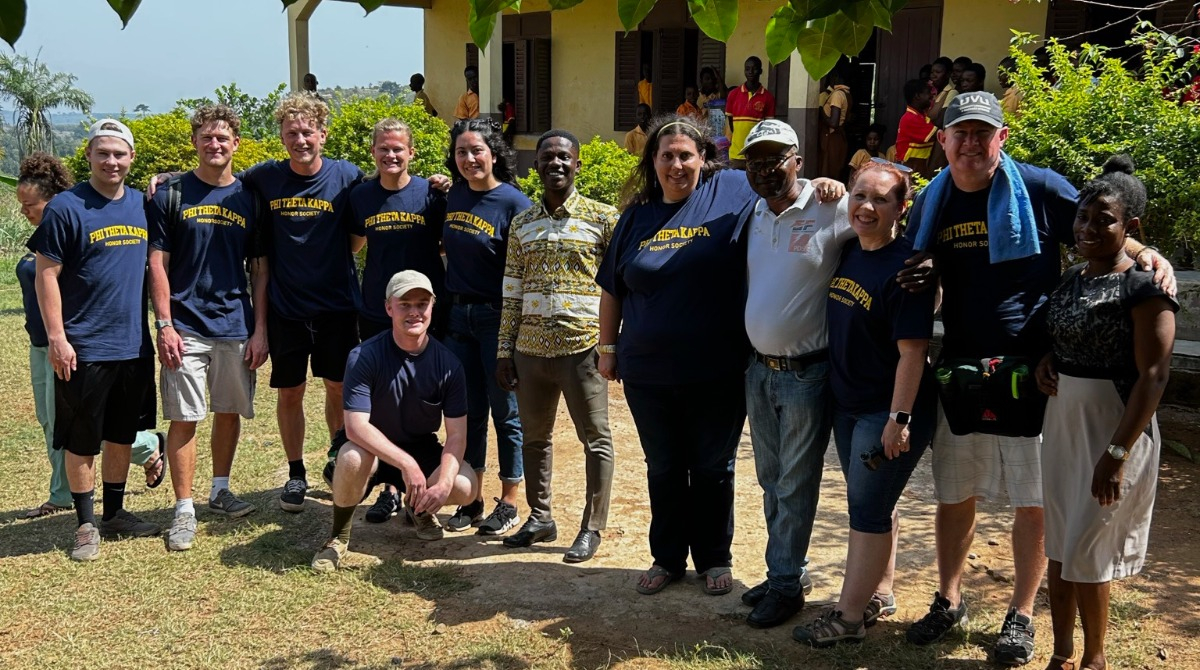While many Utah Valley University (UVU) students spent their spring break on vacation, visiting home, or hanging out with friends, eight students from the Phi Theta Kappa Honors (PTK) Society spent their time off in Mobia, Ghana to help build the community a school and conduct qualitative interviews with the locals.

While many Utah Valley University (UVU) students spent their spring break on vacation, visiting home, or hanging out with friends, eight students from the Phi Theta Kappa Honors (PTK) Society spent their time off in Mobia, Ghana to help build the community a school and conduct qualitative interviews with the locals.
Mobia is a remote farming village in the Ashanti region of Ghana. It has no running water or electricity and is accessible by “dancing roads” — rough dirt roadways that lead to the village. Stricken by generations of poverty, the village’s only economic recourse is farming.
UVU’s PTK Chapter, Alpha Sigma Theta, partnered with Empower Playgrounds — a non-governmental organization that helps create electricity-generating playground equipment for communities with low rural electrification rates — to help build the community a school.
“[In Ghana,] if your educational opportunities are poor — or nonexistent, in this case —then you’re faced with the perpetual problem of disadvantage,” said Darin Eckton, PTK faculty advisor and Student Leadership and Success department chair. “Farming remains in farming families, and they can't break that chain of poverty without educational opportunities.”
Prospects for upward mobility within the village are especially challenging given Ghana’s proximity to the equator, with darkness arriving earlier in the day.
“Ghana gets dark very early, and when these kids return from school — if they go at all — they come home, and they immediately engage in chores, typically in farming activities to help contribute to the family and earn money,” Eckton said. “And by the time they're done, it's dark. With no light, they cannot study. They cannot read. They cannot do homework.”
Dr. Eckton’s group comprises officers from Alpha Sigma Theta. The group’s humanitarian trip helped complete an institutional-level project required to achieve a five-star chapter status and build a local school while helping generate electricity for the community.
Additionally, the officers worked and lived among the people of Mobia, interviewing the residents to collect qualitative data on the villagers’ attitudes toward education. Sixty-five adults were interviewed over the week while several students aided with the school’s construction.
“I think sometimes it's possible when we're in a formal learning environment that we let the bookwork get in the way of learning,” Eckton said. “With engaged learning, these types of experiences, particularly an international experience like this, really create a foundation to expand perspectives on how we see the world. We expand and build on our perspectives to become more engaged global citizens.”
Students reported overwhelmingly positive experiences in Ghana, saying it gave them engaged learning opportunities and helped them open their eyes to the rest of the world. Deaf student and accounting major Julie Boekweg recalled such an eye-opening experience.
“I was very surprised that during our time in Mobia, someone came and said, ‘Hey, we have a deaf person here, and this child has no access to sign language because nobody in the community signs,’” Boekweg said. “It's a rural community, so nobody in the village signs. I could just see that even though he's lacking access to sign language, he's still very intelligent and engaged with people. I was amazed to see how quickly he picked up skills.
“I was really grateful that we went there and that someone thought to bring him to our attention,” she said. “He’s going to a deaf school in January. Without us coming, maybe that wouldn't have happened for him.”
“I think [engaged learning] makes your education more fun, and it makes you more excited about your classes,” math major Abigail Gutierrez said. “I feel like being involved in your discipline outside the classroom gives you meaning as a student.”